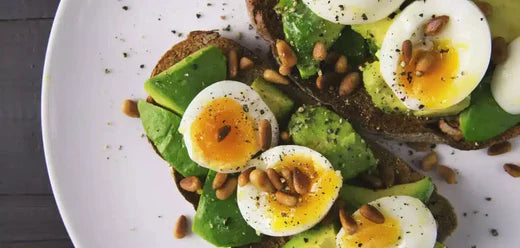
High-protein diet: We tell you everything!
Have you ever heard of the high-protein diet? A diet that can help you lose weight quickly?
Before you try the adventure, we're going to tell you everything you need to know about this famous diet.
What is a high-protein diet?
A high-protein diet is a diet that involves eating protein-rich foods and limiting carbohydrate and fat intake. It focuses on eating foods low in carbohydrates and fats, with the goal of losing weight quickly by consuming fat-burning foods.
In other words, it's about eating foods like meat, fish, eggs, and dairy while cutting out carbohydrate-rich foods like bread, pasta, and rice. It's important to note that when you're trying to build muscle, it's important to consume enough protein; but be aware that not all proteins are created equal and not all are suitable for your needs.
How does it work?
A high-protein diet works by reducing calorie intake and increasing satiety, or protein intake. This helps reduce appetite and promote weight loss by forcing your body to tap into its fat stores for energy. Protein has a greater thermic effect than carbohydrates or fats, meaning the body burns more calories to digest it.
How to do it?
What foods should you favor?
To succeed on a high-protein diet, it's important to prioritize protein-rich foods. Lean meats, fish, and low-fat dairy products are recommended. Green vegetables and low-carb vegetables are also recommended.
Here is a non-exhaustive list of foods to favor during a high-protein diet:
| Food category | Examples |
|---|---|
| Lean meats | chicken, turkey, veal, beef, rabbit |
| Fish and seafood | Salmon, tuna, cod, shrimp, mussels, oysters |
| Eggs | Whole eggs, egg whites, omelets |
| Vegetables | Broccoli, cabbage, spinach, green beans, zucchini, peppers, mushrooms |
| Fruits | Berries, melon, watermelon |
| Seeds and nuts |
Almonds, walnuts, chia seeds, flax seeds |
| Cereal products | Brown rice, quinoa, oats, whole wheat |
| Drinks | Water, tea and coffee without sugar |
It's important to note that animal protein sources are richer in essential amino acids than plant-based sources. However, plant-based proteins can be an excellent source of protein if combined correctly and consumed in sufficient quantities. It's also important to consume foods rich in fiber to maintain healthy bowel movements.
You can also consume protein powder and adapt it to your desires thanks to the different flavors offered.
The principles of the high-protein diet
The basic principle of the high-protein diet is to consume protein-rich foods and limit foods high in carbohydrates and fats. It's important to drink enough water to avoid dehydration and avoid processed foods and sugary drinks, along with taking dietary supplements and exercising regularly.
How long before effects are seen?
The high-protein diet should be followed for a limited period of time, usually a few weeks to a few months. It is not recommended to follow this diet for a long period of time, as it can lead to nutritional deficiencies. Once you have reached your weight loss goal, it is advisable to adopt a more balanced diet to maintain your ideal weight.
Example of a typical menu
Here is an example of a typical menu for a day on a high-protein diet:
| Meal | Food |
|---|---|
| Breakfast | 2 scrambled eggs, 2 slices of turkey ham, 1 slice of toasted wholemeal bread |
| Morning snack | 1 natural yogurt 0% fat |
| Lunch | 120g grilled chicken, 100g quinoa, 150g steamed broccoli |
| Afternoon snack | 1 slice of turkey breast, 10 almonds |
| Dinner | 150g grilled salmon, 150g grilled zucchini, 100g wholegrain rice |
It's important to note that this menu is provided as an example, and it's essential to vary your protein sources and choose vegetables of different colors to benefit from a wide range of nutrients. It's also crucial to respect individual calorie needs and adapt quantities according to your weight, height, physical activity level, and goals.
What are the effects?
The benefits of the diet?
A high-protein diet may have some health benefits, including weight loss and muscle gain. Protein is essential for building and repairing muscle tissue and improving body composition and heart function , making it a crucial component for those who exercise.
Additionally, high protein intake can help regulate hunger and reduce appetite, which can aid weight loss. This is because protein has a greater satiating effect than carbohydrates or fats.
The dangers?
However, it's important to remember that a high-protein diet can pose health risks if not followed properly. Indeed, excessive protein consumption can cause kidney overload, digestive problems, and fiber, vitamin, and mineral deficiencies. In addition, depriving yourself of certain food groups can lead to a deficiency in essential nutrients. Other, more benign effects can also be observed, such as bad breath or loss of muscle mass.
Our opinion
It is important to always consult a healthcare professional before starting any diet. If you decide to follow a high-protein diet, be sure to choose foods rich in quality protein, such as lean meats, fish, eggs, and legumes. Avoid processed foods and high-protein supplements.
Ultimately, it's best to adopt a balanced and healthy diet that provides all the nutrients needed for good health and optimal body weight in the long term. The key to weight loss is patience, persistence, and a long-term commitment to a healthy lifestyle.